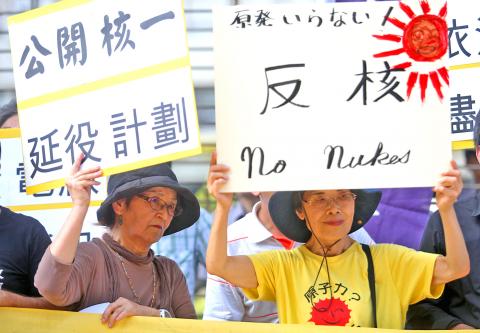Panelists at this year’s No Nukes Asia Forum (NNAF) in Taipei yesterday highlighted the risks posed by nuclear energy and its rapid expansion despite the Fukushima Dai-ichi nuclear power plant disaster three years ago.
NNAF Japan coordinator Daisuke Saito told the forum that three years after the meltdown in Japan, about 140,000 displaced residents still live in shelters.
Despite spending ¥10 trillion (US$91.7 billion) to remove a 10cm-thick layer of soil contaminated by nuclear radiation, the Japanese government has yet to succeed in purging the land, he added.

Photo: CNA
The hope to abolish nuclear energy is a universal one, Saito said, citing as an example Japan’s Kagoshima Prefecture, where discussions on the reactivation of Sendai Power Plant are taking place, prompting about 16,000 Tokyo residents to take to the streets last week to protest the plan.
An additional 8,000 Kagoshima residents rallied in their hometown — a remarkable display of public opinion in the rural prefecture, he said.
Saito also apologized in his capacity as a Japanese national on behalf of Japanese companies Hitachi Ltd and Toshiba Corp for exporting nuclear reactor modules to Taiwan that were used in the construction of the Fourth Nuclear Power Plant in New Taipei City’s Gongliao District (貢寮).
Mari Takenouchi, a Japanese reporter from Okinawa Prefecture, accused the UN Scientific Committee on the Effects of Atomic Radiation of publishing false studies that claim nuclear radiation is “harmless” to the human body.
Calling the committee’s move “criminal,” she said that the UN might appear to show concern over threats posed by nuclear power, but it is lobbying for development of the high-risk energy.
She said the chance of contracting thyroid cancer in Fukushima used to be one in 1 million, but after the nuclear accident, the figure rose to one in 3,000.
Takenouchi said the nuclear radiation emitted in the aftermath of the accident not only affected Fukushima residents, but spread across a vast area.
“My family and I were in Tokyo on March 15, 2011, when a nuclear cloud [generated from the Fukushima nuclear meltdown] passed over the city. During the several weeks that followed, my son developed fever 12 or 13 times, lost weight and had rashes all over,” she said.
Since the accident, many Fukushima residents reported symptoms including vomiting, abnormal nosebleed and loss of body hair, Takenouchi added.
Daniel Tam (譚棨禧), a member of the Hong Kong Alliance Against Nukes, warned of the rapid pace at which China is constructing nuclear plants in its coastal provinces, saying that it has least 20 operating plants and is planning to build 28 more.
“Countries all over the world have been more cautious with their nuclear energy policies after the Dai-ichi disaster. Yet, China is building nuclear plants at a speed unprecedented in human history,” he said.
“Hong Kong has been using nuclear energy for more than 20 years. Therefore, many Hong Kongers feel obligated to monitor the operation of power plants. I hope that the people of Taiwan and Hong Kong can have more interactions by disseminating information on this issue,” he said.

‘DENIAL DEFENSE’: The US would increase its military presence with uncrewed ships, and submarines, while boosting defense in the Indo-Pacific, a Pete Hegseth memo said The US is reorienting its military strategy to focus primarily on deterring a potential Chinese invasion of Taiwan, a memo signed by US Secretary of Defense Pete Hegseth showed. The memo also called on Taiwan to increase its defense spending. The document, known as the “Interim National Defense Strategic Guidance,” was distributed this month and detailed the national defense plans of US President Donald Trump’s administration, an article in the Washington Post said on Saturday. It outlines how the US can prepare for a potential war with China and defend itself from threats in the “near abroad,” including Greenland and the Panama

A wild live dugong was found in Taiwan for the first time in 88 years, after it was accidentally caught by a fisher’s net on Tuesday in Yilan County’s Fenniaolin (粉鳥林). This is the first sighting of the species in Taiwan since 1937, having already been considered “extinct” in the country and considered as “vulnerable” by the International Union for Conservation of Nature. A fisher surnamed Chen (陳) went to Fenniaolin to collect the fish in his netting, but instead caught a 3m long, 500kg dugong. The fisher released the animal back into the wild, not realizing it was an endangered species at

The High Prosecutors’ Office yesterday withdrew an appeal against the acquittal of a former bank manager 22 years after his death, marking Taiwan’s first instance of prosecutors rendering posthumous justice to a wrongfully convicted defendant. Chu Ching-en (諸慶恩) — formerly a manager at the Taipei branch of BNP Paribas — was in 1999 accused by Weng Mao-chung (翁茂鍾), then-president of Chia Her Industrial Co, of forging a request for a fixed deposit of US$10 million by I-Hwa Industrial Co, a subsidiary of Chia Her, which was used as collateral. Chu was ruled not guilty in the first trial, but was found guilty

DEADLOCK: As the commission is unable to forum a quorum to review license renewal applications, the channel operators are not at fault and can air past their license date The National Communications Commission (NCC) yesterday said that the Public Television Service (PTS) and 36 other television and radio broadcasters could continue airing, despite the commission’s inability to meet a quorum to review their license renewal applications. The licenses of PTS and the other channels are set to expire between this month and June. The National Communications Commission Organization Act (國家通訊傳播委員會組織法) stipulates that the commission must meet the mandated quorum of four to hold a valid meeting. The seven-member commission currently has only three commissioners. “We have informed the channel operators of the progress we have made in reviewing their license renewal applications, and